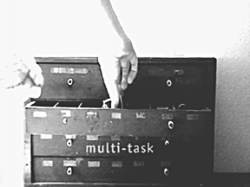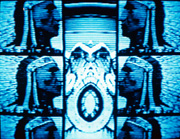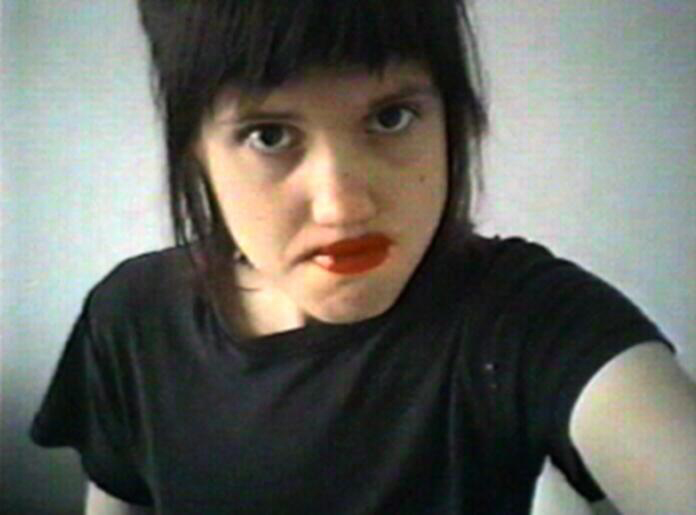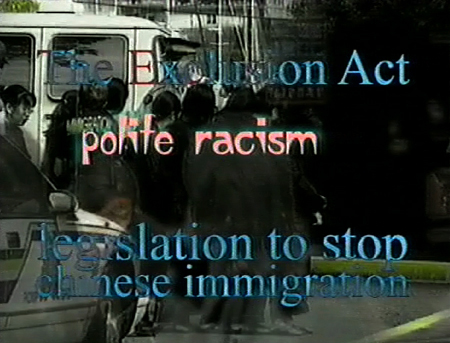Part of Summer 2001
Co-curator Winston Xin In Person
Vancouver is elsewhere, spatially and mentally. When some think of Vancouver, they think of majestic mountains and ocean blue. Well, we want none of that! Our salmon sushi is tainted. Too late for a refund! The city is rocking at the edge of the continent, forever with millennial fever in the air, or is it simply the giddiness of the end of time? Port town there means crack town, heroin town, sleazy town, party town, boys for hire, girls to rent, meeting place for nomads, immigrants new and old, point of extremes, home of cultural cynic Douglas Coupland…
States of Alterity captures the similar complexity of the vibrant Vancouver video art scene through its work with overlapping themes of cultural hybridization, colour, sexuality, age, money, medication, urban dysfunction…Duke and Battersby’s Being Fucked Up is crack delirium at its experiential best, while Ken Anderlini takes aim with his seasoned Hose. Mona Hatoum’s trenchant Eyes Skinned, produced at Western Front in 1988, still speaks forcefully, while young Thirza Cuthand takes older dykes to task in Untouchable, and Wayne Yung’s lyrical The Photographer’s Diary exposes hunky dancing satyrs à la Evergon. Other work by Laurel Swenson, Dana Claxton, Paul Wong and James Diamond.
“In Vancouver, video art is produced mainly through the two artist-run centres: The Western Front and Video In Studios. Both formed in 1973, these centres continue to play a crucial role in the production and exhibition of independent video. The videos made at the Western Front are primarily produced through the Front’s residency programme which provides a space for artists to experiment. The Western Front is an interdisciplinary centre with video art being just one of the several artistic forms that the centre supports, while most art and community videos produced in Vancouver are made at Video In. Video In, founded by activists, is committed to providing access to artists and non-artists who want to explore the medium. Women, queers, native people and people of colour often dominated much of the scene at Video In; and it is precisely this intersection between art and politics which historically sets Video In apart from the Western Front.
It’s difficult to pinpoint a Vancouver &lrquo;˜style’ when one is immersed in the video art scene itself. Although, if we have to be reductive, we should say that the majority of work has sociopolitical overtones, namely themes of various sorts of alterity or difference. In the old more modernist days, the concerns were more about the purity of the video image and the relationship between the artist and the camera. Now, it’s about the artist, the degree of sophistication of the editing system, and her or his stories to tell. Recently, there seems to be a split between artists who are enthusiastically embracing new digital technology and the ones – who, incidentally, seem to be the younger and newer video artists – are conciously rejecting the fancy editing systems in favour of low-tech, low-cost, immediate approaches.
Our programme States of Alterity: A Screen Capture of Vancouver Video is an attempt to present a sharp selection of work, culled from the last couple of decades, by Vancouver-based artists that addresses the complex and overlapping themes of cultural hybridity, colour, sexuality, age, class, and contemporary urban life. Our main aim here is to present work that demonstrates the complexity of video concerning alterity being made in Vancouver – its transgressed boundaries, layered, competing and besmirched differences, our assumptions challenged…Let’s now let the artists speak to their West Coast experience.” (Winston Xin)
Programme:
Being Fucked Up, Cooper Battersby and Emily Vey Duke, 2001, 11:00 min.
Using low-tech video and crude animations, Being Fucked Up, is a reminder of the rich performative history within video, but with bit-sized vignettes capable of holding the attention span of the MTV generation. It’s a funny, complex tape weaving together themes of hopelessness, self-hatred, and disaffection.
The Man from Venus, James Diamond, 4:00 min, 2000
This piece explores similar themes of personal confusion, rootlessness and loss. By using fragmented, stream-of-consciousness narrative, The Man from Venus poetically articulates the conflicts and inner confusion of living in a world dictated by strict binary gender roles and the need to label and define oneself accordingly.
Untouchable, Thirza Cuthand, 4:15 min, 1997
Untouchable explores the struggles between intergenerational partners and the powerlessness felt by youth.
Eyes Skinned, Mona Hatoum, 4:00 min, 1988
Made during Hatoum’s residency at Western Front in 1988, Eyes Skinned, is a haunting look at the brutality directed at Palestinian people, which also functions as a critique of the mass media’s depiction of the struggle.
I Want to Know Why, Dana Claxton, 7:00 min, 1994
Made during a residency at Western Front, the politically charged, techno-driven I Want to Know Why is one of the earliest examples of video artists using the music video format for sociopolitical critique. I Want to Know Why is a powerful expression of personal rage, sorrow and indignation against the racism and poverty suffered by First Nations people.
intermission
Miss Chinatown, Paul Wong, 4:30 min, 1997
In 1997, Paul Wong was one of the judges for the extravagant Miss Chinatown Beauty Pagent. Wong lifts the televised footage of the show and layers picture-in-picture clips from his own video, Blending Milk & Water: Sex in the New World. Miss Chinatown is a flip and sly comment (attack?) on big money Chinese Vancouver cultural events staged to re-enforce the &lrquo;˜good immigrant’ experience.
Hose, Ken Anderlini, 9:00 min, 1998
An experimental in piss: pissed as in on, as in off, and as in hosed. Juxtaposing the utopian promise of sexuality in the 70s with the reality of cybersex, “safe sex” (!) in the 90s, Hose examines the revolutionalry promise of watersports in an age when sex may no longer make a difference.
How to be a Recluse: 7 Easy Steps, Laurel Swenson, 5:00 min, 1998
A splendid contemplation on personal isolation and its consequences.
The Photographer’s Diary, Wayne Yung, 26:00 min, 2000
Wayne Yung’s ode to Canadian photographer, Evergon and his homo-baroque series, The Ramboys but with an Asian twist. Yung was a “Ramboy” in Evergon’s series.
Some thoughts and impressions from the artists:
“Although I Want to Know Why is not specifically about this region, the content was influenced by my experiences here, especially my indoctrination into areas of land claims and social justice, the Vancouver Indian urban experience and western hegemony and the aftermath of Oka. Oka had rippling effects right across this sacred land. My experience with other urban Indians and the continued injustice that we see daily really informed the work – as well as, the continuum of the oppression that Indian people face – my great grandmother, grandmother, my mother – me and my sister. My generation – me and my sister have worked hard against the oppression and its taken a few chunks out of us – but we have used all our mite to fight it off. In sunny Vancouver attempting to tame oppression – I am Hunkpapa Wi.” (Dana Claxton)
“It seems that in the art community we are a part of (the Western Front/Video In) there is a sense that our generation lives in the shadow of a glorious moment that came and passed in the 1970s. This is both exhilarating and defeating – we feel part of a lineage that we largely respect, but at the same time there is an inherent inadequacy in feeling that much as we may love the sensibility here, we did not help to engineer it. I wish there was a shorthand way to illustrate the lively, loving little group of artists we work with and for both in and outside this lineage (and this city), but there is not.” (Emily Vey Duke)
“Our tight budgets reflect Vancouver’s high cost of living. We cannot be extravagant now can we. The rain makes us work alone. The gray makes us crave colour.” (Laurel “the video-making slug” Swenson)
“Vancouver is a new world boom town, not yet a world class city, it perches not only on the Pacific Rim but at the cross roads of its lumberjack past and its high tech future. The layout of the city is that of a broken grid, communities are geographically fragmented and artistically there are separate camps with ideological differences in both form, content and audience – this is reflected by the eclectic video styles currently being practiced. In a small city where everyone is being a video artists for fifteen minutes there is no shortage of short tapes. Like the building boom of recent years there are a few good projects amongst the leaky condos.” (Paul Wong)
“Well, I think there’s something about migration here, almost all of us come from somewhere else, and are going somewhere else. It’s like we come to Vancouver to re-invent ourselves, and then depart as somebody new. Video In did that for me, it’s like this amazing breeding ground for new artists… It’s not just a facility full of equipment, it’s also a community where friendships are made and collaborations are formed, where we constantly influence each other by working on each others’ tapes. We cook up so many new projects just by sitting around on the smoking porch, and I don’t even smoke!” (Wayne Yung)
Biographies:
Ken Anderlini is a media artist, educator and curator based in Vancouver, BC. He works in film, video and installation. His work includes the experimental triptych Tangled Garden (1992-1994) which interrogates the construction of meaning in relation to masculinity, AIDS and the Jersey Cow. His video installations include Terms of Engagement (1995), a visually compelling performative documentary on homophobic and racist violence. He has an MFA from the School of Comtemporary Arts, SFU, and has worked as a programmer for both marginal and mainstream media arts festivals.
Cooper Battersby and Emily Vey Duke are artists working in video and printed matter. They have been collaborating since 1994 and have exhibited in Canada, the US, and Europe. They live in Vancouver.
Dana Claxton is an interdisciplinary artist who works in film, video, photography and performance art. Her artwork has been shown internationally and her installation work is held in the permanent collection of the Vancouver Art Gallery, Mackenzie Art Gallery and the Winnipeg Art Gallery. She is an active member in the arts community and has participated in panel discussions, juries and advisory committees. She has curated exhibitions in Vancouver, Calgary, Toronto and Ottawa. She is a Board Member of the Indigenous Media Arts Group, a non-profit cultural organization dedicated to the production and dissemination of aboriginal independent film and video. She teaches part time at Emily Carr Institute of Art and Design in the Critical Studies and Visual Arts Departments. She has taught First Nations Art Today and Constructed Identities.
Thirza Cuthand was born and raised in Saskatchewan. She started making videos with a handicam at the age of sixteen and has since produced ten videos and films which have screened internationally. In 1998 she was the recipient of Out On Screen’s Gerry Brunet Memorial Award for Best Canadian Video for Untouchable. Since then she has been occupying herself with curating, producing new works, performance art, and finishing a BFA at Emily Carr Institute of Art and Design. Her first retrospective was at La Centrale and GIV in Montreal in 2000. She currently lives in Vancouver and no longer considers herself a “baby dyke.” Untouchable is her last “youth” tape and has received critical recognition and at least one viewing by the vice squad.
James Diamond is an Aboriginal/Jewish self-expressionist born in Montreal. His work is generous, honest, neo-realist, therapeutic, crazy-making personal-political experimentation. He is a strong survivor of a fascinating and difficult past. He strives for comfort and justice for all humans. He will not accept rules that don’t make any sense at all. Therefore he doesn’t really believe in stuff like Mental Health, Biological Gender, Sexual Orientation, Colonization, Democracy, etc. He believes in himself.
Mona Hatoum is a Palestinian born in Lebanon who has been living and working in Britain since 1975. Her performance and video work has been concerned with the divisions between the privileged West and the Third World. Hatoum, who studied at Beirut University College and at Slade School of Art in London was an artist in residence at Western Front Art Centre in Vancouver in 1984 and 1988. She is currently a Senior Research Fellow in Fine Art at South Glamorgan Institute of Higher Education and a member of the editorial advisory committee for Third Text, a Third World perspective on contemporary art and culture.
Paul Wong is one of Canada’s premiere artists, working primarily in video, installation and performance. His work has been honored with many distinctions, including a retrospective at the National Gallery of Canada and the Bell Canada Award in 1992 for outstanding contribution to video art. Like Theresa Hak Kyung Cha, Yoko Ono and Nam June Paik, Wong is one of the few Asian artists who thrived in the North American avant-garde before the “multicultural” breakthrough of the 1980s. Paul Wong is also a controversial artist, in 1984 his multi-channel installation Confused: Sexual Views was canceled from the Vancouver Art Gallery before it opened, sparking one of Canada’s most dramatic anticensorship battles. Within the art community, he is known as intrepid advocate for art and artists. (Richard Fung, Fuse Magazine)
Wayne Yung is a video artist, writer, and performer who has been based in Vancouver since 1994. His work has often explored issues of race and sexuality from a queer Chinese-Canadian point of view. He was born in Edmonton in 1971.
Winston Xin is a Chinese-Canadian media artist, curator and writer. Originally from Malaysia, he grew up in Toronto and resides in Vancouver. Xin has been active curating video/film and cultural arts events for numerous years. He is one of the founders of Asian Heritage Month Vancouver and was the Exhibitions Coordinator and Programmer at Video In Studios, an artist-run video access centre from 1996-2000. Xin currently sits on the Artist Advisory Board of Out On Screen: Vancouver’s Queer Film & Video Festival and on the Board of On Edge.



